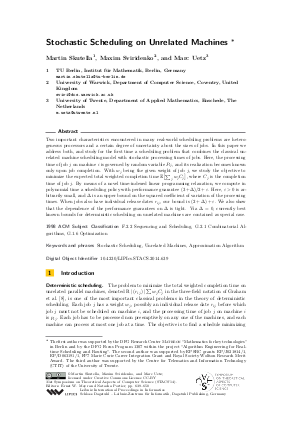Stochastic Scheduling on Unrelated Machines
Authors Martin Skutella, Maxim Sviridenko, Marc Uetz
-
Part of:
Volume:
31st International Symposium on Theoretical Aspects of Computer Science (STACS 2014)
Part of: Series: Leibniz International Proceedings in Informatics (LIPIcs)
Part of: Conference: Symposium on Theoretical Aspects of Computer Science (STACS) - License:
 Creative Commons Attribution 3.0 Unported license
Creative Commons Attribution 3.0 Unported license
- Publication Date: 2014-03-05
File

PDF
LIPIcs.STACS.2014.639.pdf
- Filesize: 0.61 MB
- 12 pages
Document Identifiers
Subject Classification
Keywords
- Stochastic Scheduling
- Unrelated Machines
- Approximation Algorithm
Metrics
- Access Statistics
-
Total Accesses (updated on a weekly basis)
0PDF Downloads0Metadata Views
Abstract
Two important characteristics encountered in many real-world scheduling problems are heterogeneous processors and a certain degree of uncertainty about the sizes of jobs. In this paper we address both, and study for the first time a scheduling problem that combines the classical unrelated machine scheduling model with stochastic processing times of jobs. Here, the processing time of job j on machine i is governed by random variable P_{ij} , and its realization becomes known only upon job completion. With w_j being the given weight of job j, we study the objective to minimize the expected total weighted completion time E[Sum w_j.C_j] , where C_j is the completion time of job j. By means of a novel time-indexed linear programming relaxation, we compute in polynomial time a scheduling policy with performance guarantee (3+D)/2+e. Here, e>0 is arbitrarily small, and D is an upper bound on the squared coefficient of variation of the processing times. When jobs also have individual release dates r_{ij}, our bound is (2+D)+e. We also show that the dependence of the performance guarantees on D is tight. Via D=0, currently best known bounds for deterministic scheduling on unrelated machines are contained as special case.
Cite As Get BibTex
Martin Skutella, Maxim Sviridenko, and Marc Uetz. Stochastic Scheduling on Unrelated Machines. In 31st International Symposium on Theoretical Aspects of Computer Science (STACS 2014). Leibniz International Proceedings in Informatics (LIPIcs), Volume 25, pp. 639-650, Schloss Dagstuhl – Leibniz-Zentrum für Informatik (2014)
https://doi.org/10.4230/LIPIcs.STACS.2014.639
BibTex
@InProceedings{skutella_et_al:LIPIcs.STACS.2014.639,
author = {Skutella, Martin and Sviridenko, Maxim and Uetz, Marc},
title = {{Stochastic Scheduling on Unrelated Machines}},
booktitle = {31st International Symposium on Theoretical Aspects of Computer Science (STACS 2014)},
pages = {639--650},
series = {Leibniz International Proceedings in Informatics (LIPIcs)},
ISBN = {978-3-939897-65-1},
ISSN = {1868-8969},
year = {2014},
volume = {25},
editor = {Mayr, Ernst W. and Portier, Natacha},
publisher = {Schloss Dagstuhl -- Leibniz-Zentrum f{\"u}r Informatik},
address = {Dagstuhl, Germany},
URL = {https://drops.dagstuhl.de/entities/document/10.4230/LIPIcs.STACS.2014.639},
URN = {urn:nbn:de:0030-drops-44946},
doi = {10.4230/LIPIcs.STACS.2014.639},
annote = {Keywords: Stochastic Scheduling, Unrelated Machines, Approximation Algorithm}
}
